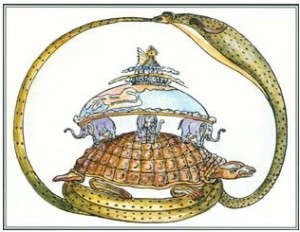Turtles all the way down…
If everything must have a cause, then God must have a cause. If there can be anything without a cause, it may just as well be the world as God, so that there cannot be any validity in that argument. It is exactly of the same nature as the Hindu’s view, that the world rested upon an elephant and the elephant rested upon a tortoise; and when they said, “How about the tortoise?” the Indian said, “Suppose we change the subject.”
Bertrand Russell, 1927
Every “thing” we can name is a system, containing components which interact. And of course, every component is a thing and thus another system, containing another level of components. And so we descend from universe to stars to humans to cells to molecules to atoms to quantum vibrations. Is there a universe of universes? There may be. Are there components to quantum vibrations? There may be.
Every “thing” is a system, and part of a larger system. No system is perfectly isolated from all other systems — although some can come close. Most systems, however, are intimately connected with their environment. In general, a system is distinct from its environment only because we make a distinction, based upon perceptions of boundaries relevant to our purposes.
Systems can be more or less:
- Differentiated vs. Homogeneous
- Organized vs. Chaotic
- Dynamic vs. Static
- Adaptive vs. Rigid
Complex systems are differentiated, organized, dynamic and adaptive. Complexity is a measure of these attributes relative to some baseline systems, or to our own level of complexity.
Living systems are highly complex systems that use available energy and environmental resources to grow and to reproduce (spawn new self-similar systems). Self-similar reproduction does not necessarily mean identical; this allows adaptability beyond the limits of the individual.
Sustainable systems are living systems that grow and evolve without exhausting necessary resources or so damaging their environment that further growth and evolution becomes more difficult or impossible.

By definition, a system cannot be chaotic. This constraint also applies to the variants: systemic and systematic. Nevertheless, I will concede that almost everything in our lives seems chaotic, but this would suggest that only “things” unrelated to ‘life” can be characterized systemically.
Hi Ed, thanks for the comment! From a philosophical perspective, it is valid to say that a system cannot be wholly chaotic and still be a system. One could look at the randomly jostling molecules of a container of hydrogen gas and call that a chaotic system, but there are still physical laws governing individual collisions, and the walls of the container impose an organizing constraint. But such a system is MORE chaotic than the atoms of carbon in a diamond crystal, which form an organized, homogeneous and static system. And also more chaotic than the molecules in a protozoa, which form an organized, heterogeneous, and dynamic system. I do not suggest that everything in our lives is chaotic. Life is the best example I can give of a complex system in which interaction is constrained to create new order through the continual dissipation of energy. Life goes against entropy within itself as a dynamic system by increasing entropy within an energy gradient.